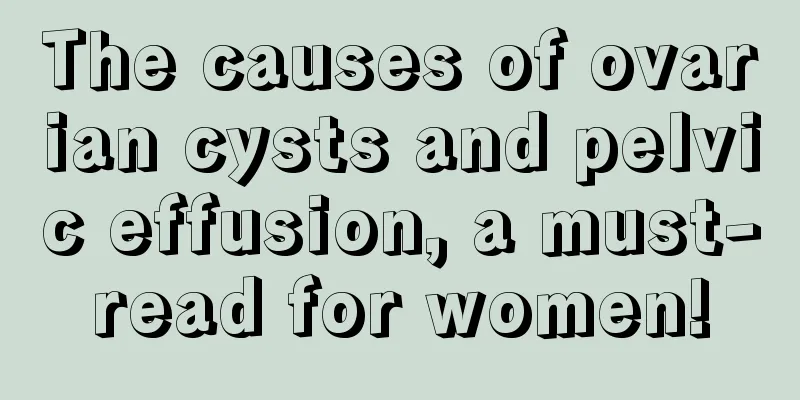The causes of ovarian cysts and pelvic effusion, a must-read for women!

|
Ovarian cysts and pelvic effusion are both common gynecological diseases in women, which pose a great threat to women's health. The formation of ovarian cysts and pelvic effusion is related to personal lifestyle, so women must pay attention to personal hygiene in daily life, do a good job of prevention, and stay away from various gynecological diseases. Causes of ovarian cysts: 1. Genetic and endocrine factors Heredity is a common cause of ovarian cysts. According to statistics, 20% to 25% of ovarian tumor patients have a family history. In addition, endocrine factors that cause ovarian cysts cannot be ignored. The main reason is that the basic pathophysiological changes in patients with ovarian cysts and polycystic ovary syndrome are that the ovaries produce too much androgen, and the excessive production of androgen is the result of the synergistic effect of abnormal functions of multiple endocrine systems in the body. 2. Lifestyle and environment Ovarian cysts caused by lifestyle mainly refer to long-term eating structure, bad living habits, and excessive psychological stress, which can lead to physiological ovarian cysts and true ovarian tumors. Environmental factors mainly include food pollution, unreasonable diet structure, and the abuse of hormone drugs and tonics such as breast enhancement, weight loss, and anti-aging by young and middle-aged women, which make ovarian tumors more prevalent and younger. Causes of pelvic effusion: 1. The influence of physiological effusion is one of the causes of pelvic effusion. Because the pelvic cavity is located at the lowest part of the abdominal cavity, when exudate or leakage occurs, it will be drained into the pelvic cavity, thus forming fluid accumulation. Some women will experience a small amount of blood accumulation in the pelvic cavity during menstruation or ovulation, resulting in effusion. Such pelvic fluid accumulation is sometimes a good thing, as it proves that a woman's fallopian tubes are open. 2. The influence of pathological effusion is also one of the causes of pelvic effusion. Clinically, the effusion in most patients is caused by inflammation, mainly the presence of inflammatory exudate in the patient's pelvic cavity. At this time, if it is not treated in time, it will gradually grow larger. When it grows to a certain size, it is generally not curable with medication and requires surgical treatment. 3. The formation of pelvic effusion is also related to women’s living habits. Normally, if women do not pay attention to personal hygiene, or have sexual intercourse after menstruation or childbirth, it is easy to cause infection. This in turn leads to the occurrence of disease. |
<<: The charm of women lies in these, have you done it?
>>: Which foods are high in calcium? Which foods contain a lot of alkali?
Recommend
What are the dietary treatments for amenorrhea in girls?
For a young girl, if she has just had her period ...
Withdrawal bleeding 20 days ectopic pregnancy
If you do not take proper contraceptive measures ...
What medicine should women take to treat frequent dreams?
The situation of dreaming too much happens to a w...
Itchy red spots below
Gynecological diseases are a common disease among...
How to treat pelvic inflammatory disease and pelvic effusion? It turns out there are 5 ways
Pelvic inflammatory disease and pelvic effusion a...
50 days of pregnancy, boy's gestational sac
With the advent of the two-child era, many people...
Does accessory breast have nipples?
Accessory breasts refer to the presence of many s...
Post-hysterectomy care
Uterine fibroids are a common disease all over th...
When is the best time to eat papaya for breast enhancement?
There are many ways to enlarge your breasts, but ...
Why does my belly hurt after cesarean section?
Women who have undergone cesarean section need to...
Can I have an abortion if I have cervical erosion? What do the experts say?
The occurrence of cervical erosion has a great im...
How often should I breathe during late pregnancy?
In the late pregnancy, hypoxia requires oxygen in...
These diseases are all related to obesity! If your weight exceeds this number, you are in danger!
How many obese people are there in China? After 1...
What medicine should I take during menstruation to expel dirty blood?
The so-called menstrual blood refers to the dirty...
Is the fetus formed at 55 days of pregnancy? What does the fetus look like at 55 days of pregnancy?
We all know that after a woman becomes pregnant, ...









